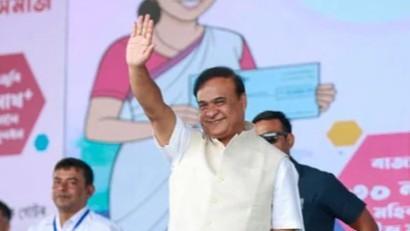
Assam CM helped Nitish work out ₹10,000 for women scheme: Report
In a remarkable display of interstate cooperation, Assam Chief Minister Himanta Biswa Sarma has been credited with playing a significant role in shaping Bihar’s scheme to provide ₹10,000 to women. According to reports, Sarma sent his bureaucrats to Bihar five months ago, at the request of the Nitish Kumar government, to share the ‘Jeevika ₹10,000 model’ that was later incorporated into the Mukhyamantri Mahila Rojgar Yojana.
The Mukhyamantri Mahila Rojgar Yojana, launched by the Bihar government, aims to provide financial assistance to women in the state, with the objective of empowering them and promoting economic growth. The scheme has been widely appreciated, and the role of Assam CM Himanta Biswa Sarma in its development has come as a pleasant surprise to many.
As per reports, NDA leaders have stated that a large part of the credit for the scheme goes to Sarma, who took the initiative to share the ‘Jeevika ₹10,000 model’ with the Bihar government. The model, which has been successfully implemented in Assam, provides financial assistance to women, enabling them to start their own businesses and become financially independent.
Sarma’s bureaucrats, who were sent to Bihar, made a presentation before officials on the ‘Jeevika ₹10,000 model’, highlighting its key features and benefits. The presentation was well-received, and the Bihar government decided to incorporate the model into the Mukhyamantri Mahila Rojgar Yojana.
The Mukhyamantri Mahila Rojgar Yojana is a significant initiative, aimed at promoting women’s empowerment and economic growth in Bihar. The scheme provides financial assistance of ₹10,000 to women, enabling them to start their own businesses, pursue vocational training, or acquire skills that can help them secure employment.
The role of Assam CM Himanta Biswa Sarma in shaping the scheme has been widely appreciated, with many praising his initiative and willingness to share best practices with other states. The cooperation between the Assam and Bihar governments is a shining example of how states can work together to achieve common goals and promote development.
The ‘Jeevika ₹10,000 model’ has been successfully implemented in Assam, with thousands of women benefiting from the scheme. The model provides financial assistance to women, enabling them to start their own businesses, such as small-scale industries, agriculture, or animal husbandry. The scheme has been instrumental in promoting women’s empowerment and economic growth in Assam, and its incorporation into the Mukhyamantri Mahila Rojgar Yojana is expected to have a similar impact in Bihar.
The cooperation between the Assam and Bihar governments is not limited to the Mukhyamantri Mahila Rojgar Yojana. The two states have been working together on several other initiatives, including education, healthcare, and infrastructure development. The partnership between the two states is a significant step towards promoting regional development and cooperation.
In conclusion, the role of Assam CM Himanta Biswa Sarma in shaping the Mukhyamantri Mahila Rojgar Yojana is a significant one, and his initiative to share the ‘Jeevika ₹10,000 model’ with the Bihar government has been widely appreciated. The scheme is expected to have a positive impact on women’s empowerment and economic growth in Bihar, and the cooperation between the Assam and Bihar governments is a shining example of how states can work together to achieve common goals.






